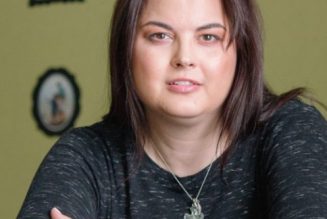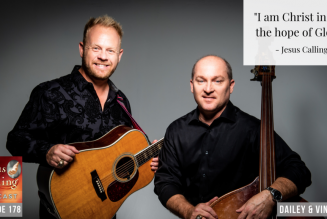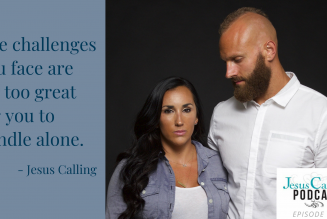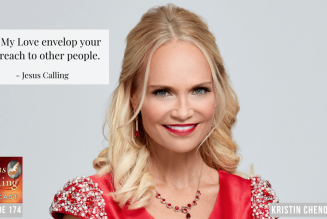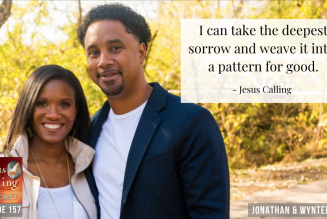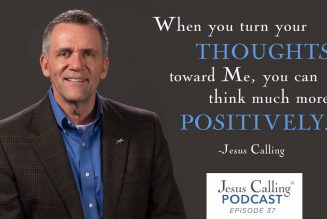
Steven: What my prayer has been, and was from the very beginning in my marriage and in my family, is, “God, I want more than anything for my wife and my children to be able to stand and say, ‘Albeit very imperfectly, that man was determined to love God and love us.’”
A Father’s Love Is Special: Steven Curtis Chapman and Mark Miller (and their daughters!) – Episode #151
Narrator: Welcome to the Jesus Calling Podcast. Our guests are a pair of father-daughter duos who have enjoyed a close relationship in the various seasons of their family’s lives and discuss the impact of fatherhood and being fathered: Christian singer/songwriter Steven Curtis Chapman and his daughter Emily Chapman Richards, and country music artist and Christian music producer Mark Miller and his daughter Madison Brown.
As Steven Curtis Chapman grew up in Paducah, Kentucky, he fell in love with the way his father not only expressed himself through music, but also the way he expressed his deep love for God. Steven worked hard to carry these lessons into his own family. Today he and his daughter Emily tell us what it was like growing up in the Chapman house and how as a child, Emily led the family to become the ardent supporters of adoption they are today.
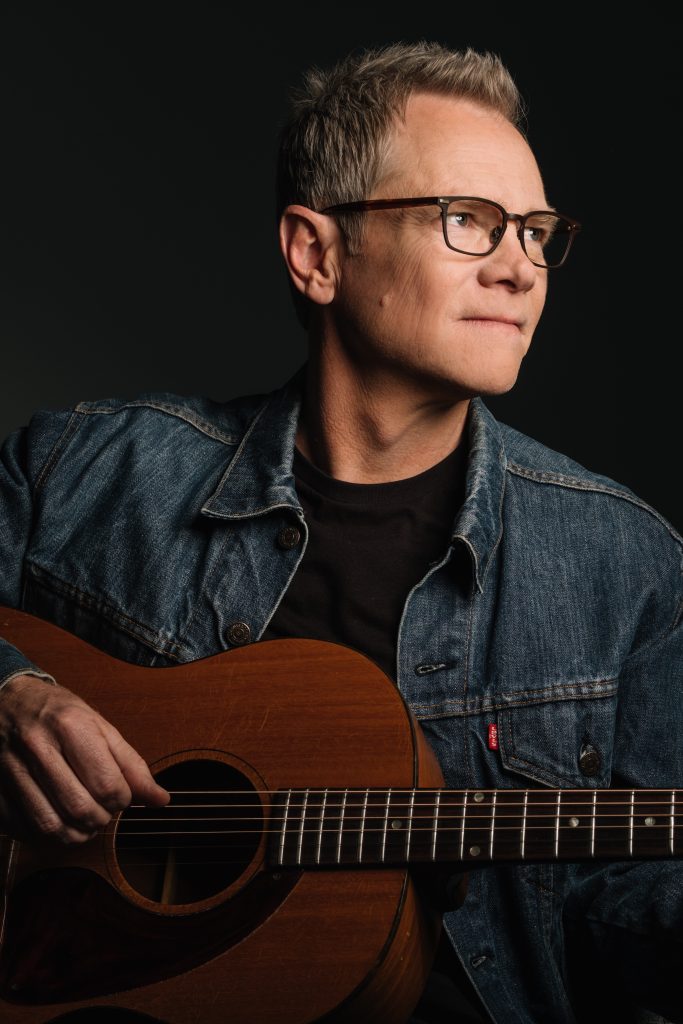
Steven: I’m Steven Curtis Chapman. I am a singer/songwriter. People probably most know me, if they recognize those three names at all, maybe it’s from some of the music that I’ve written and recorded over the last thirty-two years now. Wow. I can’t even believe that.
Emily: Hi, my name is Emily Chapman Richards, and I am the lucky, lucky eldest daughter of Mary Beth and Steven Curtis Chapman. I am currently serving as the executive director of Show Hope, a nonprofit organization that seeks to care for orphans by engaging the church and reducing barriers to adoptions. It was co-founded by my parents in 2003, and I’ve been here for a decade of working, which I love. Probably most importantly, I am the wife of Tanner Richards and the mother to three beautiful ladies: Eiley, Della and Verity.
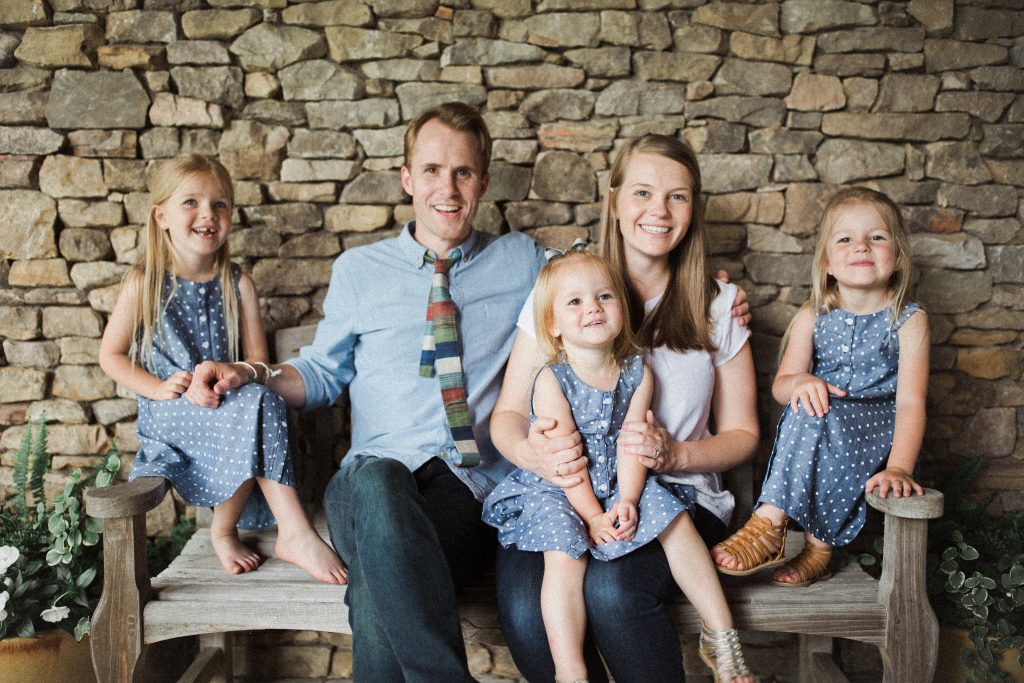
“My dad’s got my back.”
Steven: I remember my earliest memories are of my dad kind of stopping in the middle of the conflicts that happened a lot in our home, because there was so much shame and anger and confusion in my dad’s heart. He would stop and say, “You know what? We need to pray.” And I remember we would just get on our knees as a family, and Dad would just talk to God like a friend. He just would say, “God, I don’t know how to be a father. I don’t know how to be a good husband. Please help me. Please show me how to do that.”
My dad didn’t have a father in his life. Sadly, his dad left home when my dad was three. That was a gaping hole. And on top of it was a lot of shame and embarrassment. It wasn’t something we really talked a lot about growing up, except that I remember when my dad really began to walk with the Lord when I was seven years old.
And so I was marked, even as a little boy, with the reality that the place you’re going to ultimately know how to have a relationship with your children is out of brokenness. There’s going to be brokenness. But [I also learned to have] desperation for God to just give you that wisdom as our Heavenly Father.
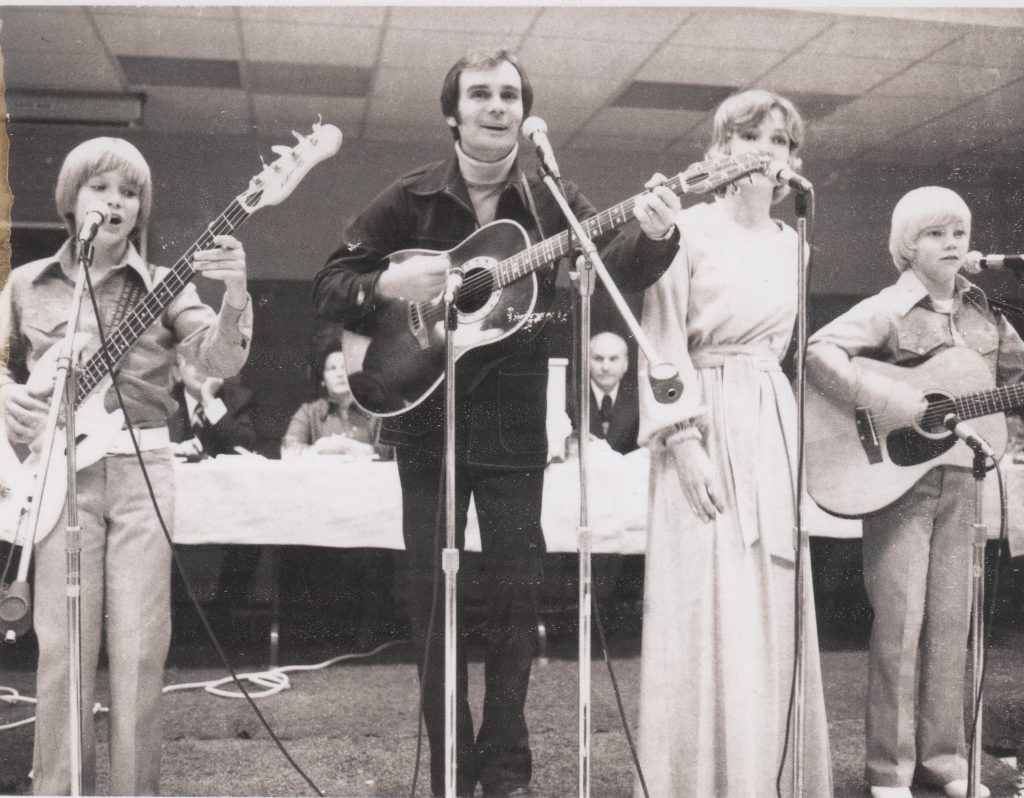
And so my dad, even with all that brokenness he modeled for me, he was gone a lot. He was at a music store, our music business. His work day usually started right before I got home from school and went until after I was asleep, so I don’t remember having a lot of my dad except on weekends. And we did some fishing together and hunting together, things like that. [We made] some really great memories, but it wasn’t him coming home every night at five or six o’clock and having a lot of time with him.
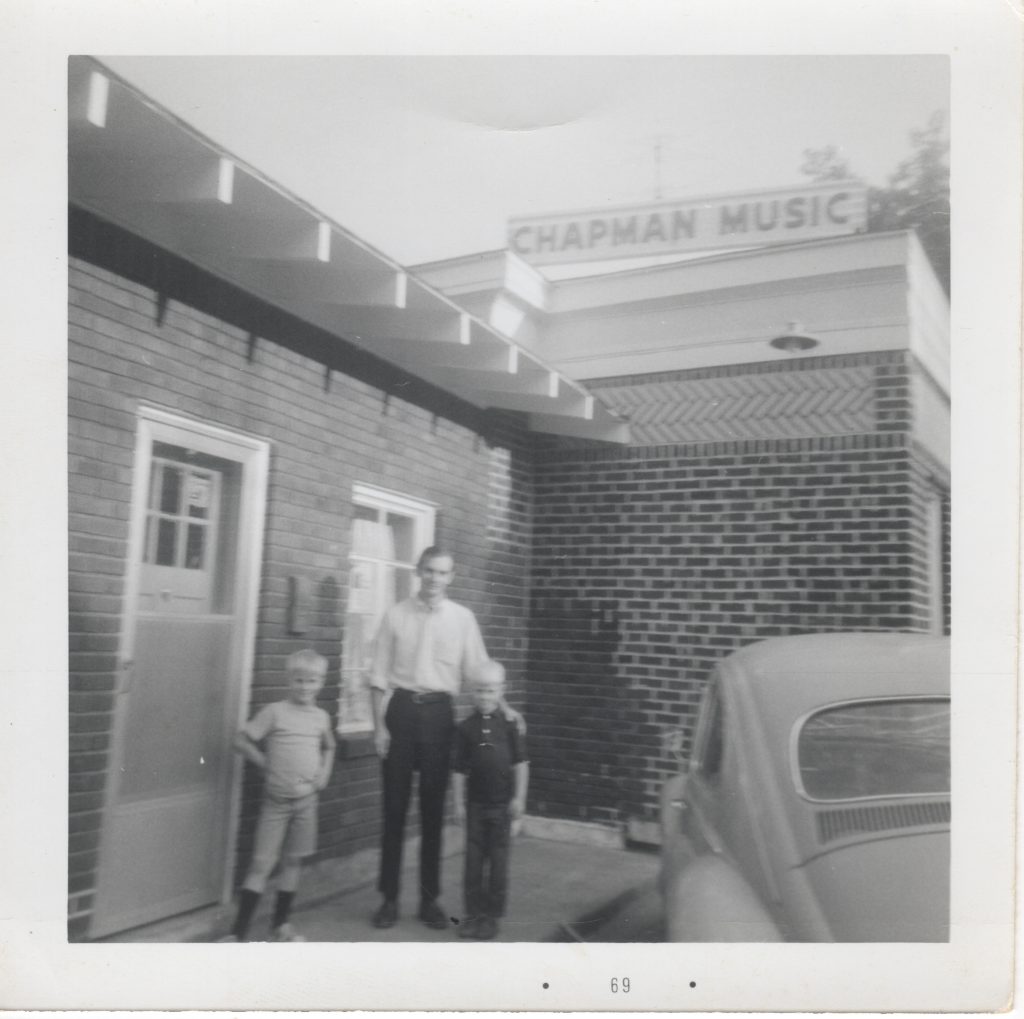
But I do remember the time that we had as very being intentional. I remember the notes that came from my dad. He would leave notes for me and my brother often. He’d say a prayer for us and things like that. I remember deeply saying, “Yep, my dad, even if he’s not here in physical presence, I know that I’m in his heart and I’m on his mind. I’m in his prayers and his thoughts. He’s got my back, and he sees me.”
“My dad, even if he’s not here in physical presence, I know that I’m in his heart and I’m on his mind. I’m in his prayers and his thoughts. He’s got my back, and he sees with me.” – Steven Curtis Chapman
Being a Present Dad Takes Intention
Emily: Oh my goodness, I love my dad. Dad has always, and continues to remain to this day, very intentional with every moment he has been. I think it’s evident even in his songwriting: he takes captive every word, every three minutes he has with an audience. That’s exactly the same in how he has fathered me and all of my siblings, in that every kind of moment when he was home was, really intentional to be present with us.
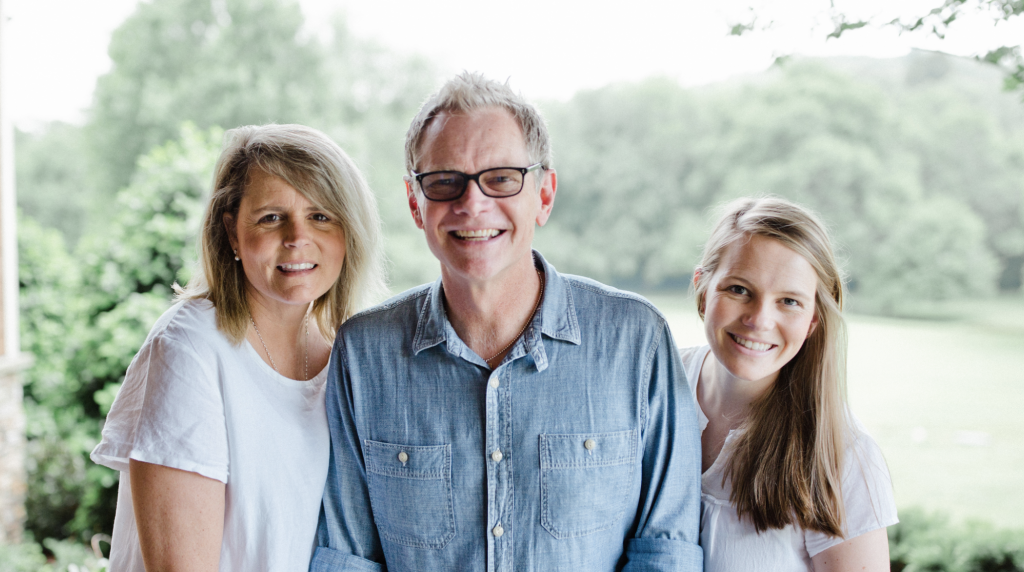
“I love my dad. Dad has always, and continues to remain to this day, always very intentional with every moment he has.” – Emily Chapman Richards
I have memories of Dad being on the road, but he’d take a red-eye to come home and be at some basketball game where I couldn’t even make a basket. But he’d come home just to be present. I was a terrible athlete, but he’d just be present.
I think another kind of rhythm that Dad established early on—and as I’ve become a parent, I have a new level of appreciation and just understanding the intent behind [this]—every time Dad would leave for tour (and not, like, at the beginning of the tour, but every run) he would write letters to each one of us. Sometimes they were longer, sometimes shorter. He’d leave them on the counter, and it was just a prayer for us, a Bible verse. [It took a] real commitment to take captive the intentionality, even in those moments, in those words to show that he was caring for us and loving us well.
And so I consider it an incredible privilege to have been raised by him and my mom. I just hope I can do half as good of a job.
Steven: Thank you, Emily, for that. I have to say that just for your words of blessing, I mean, there’s nothing sweeter to the heart of a dad than to hear his children bless him. And yet I am, as we all are, painfully aware of my failures and failings and flaws and faults in those areas too.
“There’s nothing sweeter to the heart of a dad than to hear his children bless him.” – Steven Curtis Chapman
It feels like the jury is out until we stand before Jesus, which then, thankfully, it’s all gonna be grace and all of that. But I don’t know if I did it—I don’t know if I did it right, if I did it well. I see moments where I did, I see a lot of moments where I didn’t. So God, just pour a lot of grace over top of all of that, please, because that’s our only hope.
Connecting Children to Loving Families
Emily: Kind of the legacy work of our family to be about advocating for the rights of kiddos that don’t have families started in 1997, a long time ago. I was in fifth grade at the time, and my mom and I had the opportunity to travel to Haiti with Compassion International on a mission trip.
We were sponsoring a child at the time through Compassion. We were able to spend some time with her. I was eleven at the time, and so a lot of the children we were meeting [who] didn’t have families and were orphans, they were a similar age to me. And so in my little brain and my little heart, [I tried] to start putting the pieces together of what life would look like without knowing where my next meal was coming from, or knowing where I was going home to, or if I was going to be able to come to school the next day—just all these questions really broke my heart and my mom’s.
We returned from that trip, and I was determined that God was really doing something in my heart. I was determined when we came home that we should become missionaries.
So I tried to 100-percent convince Mom and Dad, “We have got to move to Haiti. That is what we have to do.” And Dad and Mom were gracious to be like, “Well, Dad’s career is like pretty United States-centric. We have some international travel, but his career’s pretty much here.”
I really have to give credit to my mom and dad. They have always encouraged me to really press into what God may be speaking to my heart. And that was that was part of the fabric of how they brought us up, even from a young age.
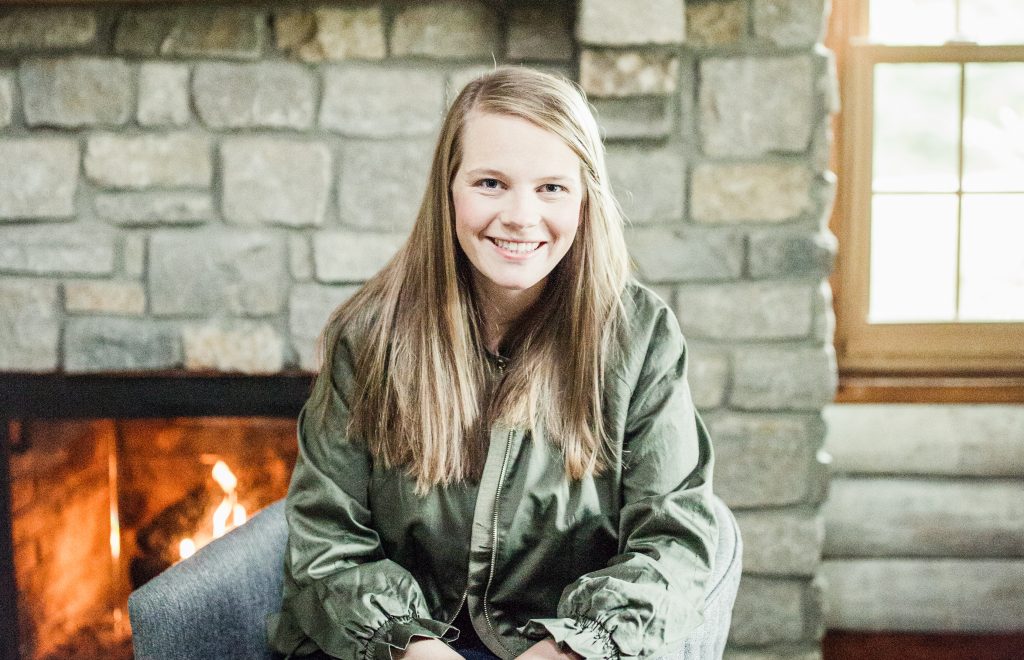
On that trip to Haiti was a family who is in the adoption process, and so my tactics I changed. I was like, “Okay, fine. If we can’t move to another country, can we consider intercountry adoption and bringing a child from another country home through adoption to our family?”
And so eventually God, in His own way and His own timing, changed my parents’ hearts to be open and excited about the idea of intercountry adoption. We started the process in 1999, a couple years later, to bring Shaoey home. So Shaoey came home from China in 2000, then Stevie Joy in 2003, and Maria in 2004.
Steven: At the time, I was very serious when I would say, “We have three children that we’ve nicknamed Eeny, Meeny, and Miney, and we ain’t having no Mo.” That was kind of a joke to say, “We’re done. We have three kids, that’s it.”
But you know, to see how God was using our daughter, and that story He was telling did, as she said, directed us to ultimately adopt Shaohannah, our first of what would become three daughters from China.
But then God directed our steps while we were in China. We got to visit Shaoey’s orphanage. We got to walk through the place where Shaoey had spent the first seven months of her life, which is very rare when you look back. Even then, not very many families got to do that.
With our own eyes, we saw hundreds of little ones in room after room that were waiting for their story to begin, waiting for a family to come say, “You belong.”
Fast forward three or four days after seeing that, or a week after seeing that and having our hearts broken while we were so overwhelmed with the gift of our daughter Shaoey, our hearts were broken with the reality of these all these children. We now have our eyes open to the fact that these children represent millions of children all over the world waiting for their story to begin.
And then immediately we are confronted with families who say, “We would love to adopt someday. We want to bring one of those children into our family, but there is the cost. The [cost barrier to] adoption is just a hurdle there’s no way we can get over. [We can’t afford the] cost of $20,000, $30,000 or $40,000 to adopt a child.”
We thought, Surely there’s an organization somewhere that’s helping families and helping these children become a part of a family.

We couldn’t find that organization. That’s very simply how Show Hope began. We just began to say, “What if we could help? Let’s start telling this story. Let’s start telling the story not only for these children and give them a voice for children that are all over the world waiting for a family, but there are families waiting for that child, wanting, longing to bring that child home.”
And so we had a dream of helping 100 families. That was a big, wild dream of, “Hey, what if we could help?” We started with 10. We said, “Maybe we could even do more if we tell a story and use the platform that God’s given Mary Beth and me with my music and our story.”
We have been able to help almost 6300 families now bring children home from 63 countries or something like that. It’s amazing, beyond anything we could have asked for or imagined.
Remembering Where the Bluegrass Grows
Narrator: In addition to their mission of bringing families and children together through adoption, music continues to be a part of the Chapman legacy. True to his Kentucky roots, Steven just released a brand-new album called Deeper Roots: Where the Bluegrass Grows, a nod to the music he grew up hearing and loving when he was a boy.

Steven: The home I grew up in, there was a lot of country folk music. My dad played music. My earliest memories really are of the sounds of folk and bluegrass music. My dad’s best friend on one side was Scottie Henson, a five-string banjo picker. His other best friend Jack Curtis Martin, where I get my middle name Curtis, was a world class dobro player who would go on to play with Lester Flatt and Earl Scruggs on the Grand Ole Opry.
Emily: Dad, I never knew that’s where your middle name was from. I didn’t know that!
Steven: That’s where it came from. Isn’t that kind of crazy?
I grew up where the bluegrass grows: Kentucky, the home of bluegrass. It’s what I heard and what I grew up loving. I’ve been talking so much about that over the last couple of years in concert, I think it got all those little sparks stirred up inside of me and I thought, I want to do a recording that sort of honors that.
And so it was really a special thing for me to go in and record an album that both honors the music I love so much that I think kind of was real formative for me as a little boy, gave me love for the guitar, and for the sound of voices blended in harmony, and those sounds of mandolins and banjos and dobros and upright bass, all those sounds that are just kind of deep inside of me.
Family Connected Through Jesus Calling
Steven: I think the way I have tried to craft the songs that I’ve written, one of my goals has been . . . you know, early on [in my career], I read an early review of one of my albums. And the reviewer said, “This is a new guy on the scene, but we feel like he’s kind of a common man’s theologian. He takes scripture and truth, and makes it something that wherever we are, it applies to real life right where we’re living today.” I was so honored by that, and so compelled by that to really dig in deep.
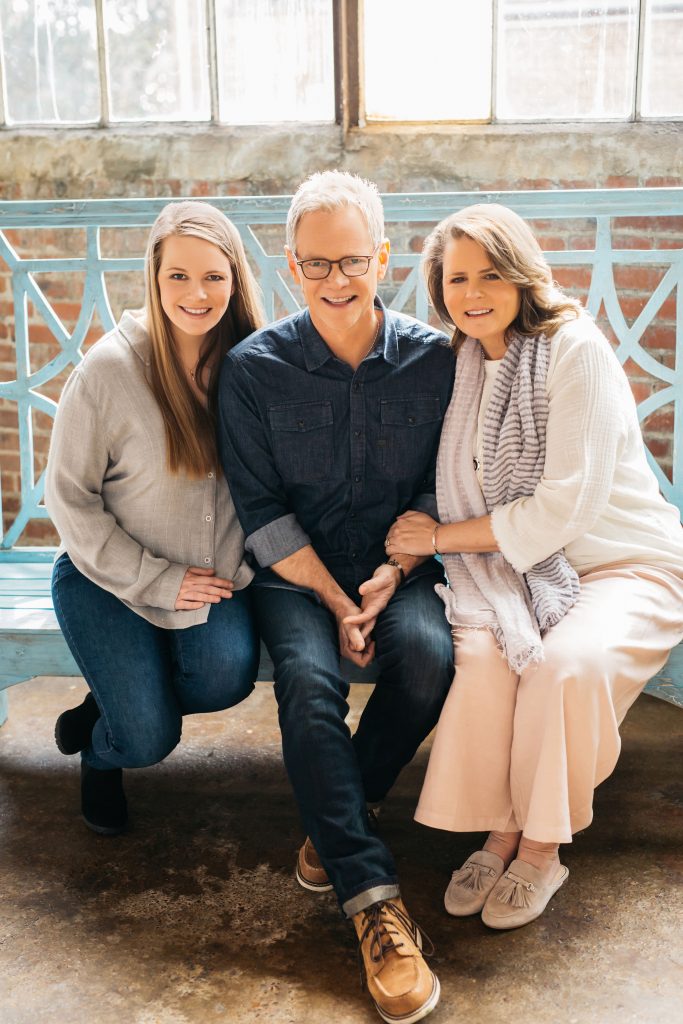
I am very much a man of shaped by great books that I’ve read. Great authors, great writers have mentored me so much. So many [people] I’ll never meet face to face have mentored me through their writings. I’m so grateful for that. And the [writing] I’ve always gravitated towards have been those that I feel like I can really take and apply to right where I am at that moment.
And that’s what’s so beautiful about Jesus Calling, I think. It’s just the approach of speaking in a language where you feel like Jesus is speaking these things to you and right into your situation. It has been so impactful, obviously, in the lives of so many, but certainly in my life, as well.
“That’s what’s so beautiful about Jesus Calling, I think. It’s just the approach of speaking in a language where you feel like Jesus is speaking these things to you and right into your situation.” – Steven Curtis Chapman
I would love to read this one from March 12th. I think this is just something that resonates with our family. Those that know our story know that we lost our youngest daughter about eleven years ago. And part of our journey has been learning to live with that kind of hole in our soul and that brokenness we are going to carry through this life with us.
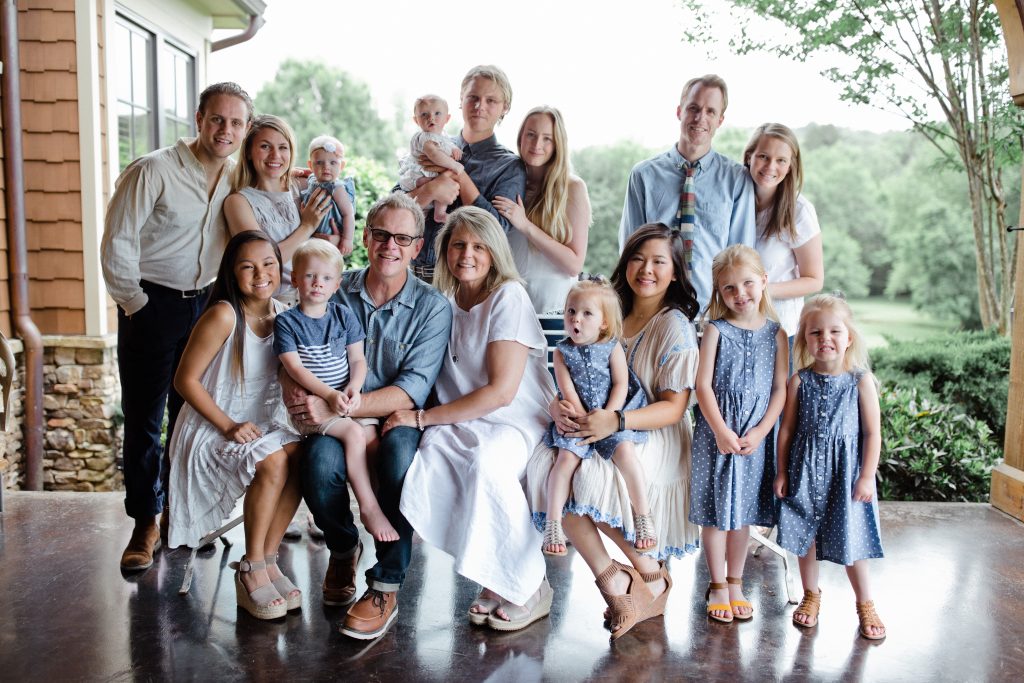
Even Jesus Calling is even written from a place of suffering, and yet somehow God meets us in that in such a profound way that we won’t be able to experience Him really any other way. We don’t like that. We don’t want that, but that’s true. We experience God in that place [of suffering]. And I think that’s why this one, March 12th, [speaks to us]. It says,
Waiting, trusting, and hoping are intricately connected, like golden strands interwoven to form a strong chain. Trusting is the central strand because it is the response from My children that I desire the most. Waiting and hoping embellish the central strand and strengthen the chain that connects you to Me. Waiting for Me to work, with your eyes on Me, is evidence that you really do trust Me. If you mouth the words “I trust You” while anxiously trying to make things go your way, your words ring hollow. Hoping is future-directed, connecting you to your inheritance in heaven. However, the benefits of hope fall fully on you in the present.
Because you are Mine, you don’t just pass time in your waiting. You can wait expectantly, in hopeful trust. Keep your “antennae” out to pick up even the faintest glimmer of My Presence.
I think our family, right now we are connected with those three words: waiting, trusting, and hoping. Because that’s our journey. We wait. We trust that the story is not over. Our hope is that our broken hearts are going to be made whole. We wait for that, and we wait for it together. We lean into each other. And so that’s a great encouragement to me, even today.
Emily: Jesus Calling for Kidsis where I’m at. It’s my whole world, and I’ve just so appreciative of it. In fact, I was reading from it last night with my little girlies, and they wanted to read the crucifixion and the resurrection stories. And to be able to read what Sarah’s written and just saying, “Hey, close your eyes and pretend that Jesus is saying this to you.” It was neat to have that tool as a mama, to help create conversation that I hope I hide in my heart and remember long from now, when they’re grown up and on their own, that I was able to have these really sweet moments with them. So, yes, it’s incredible work.

Steven: Emily is an amazing mom, and I know she is very aware of this. It’s part of the DNA of Emily that I love and pray for, because she carries a lot of the same things that her mom and dad, unfortunately, put into her of perfectionism, and [this feeling of], I’m not doing it right, and I really screwed this up, and that could do this better, and I need to do it better, and . . .
You know, it’s part of parenting. You don’t realize, I’m gonna watch my own children struggle with their own parenting and the feelings of, “Gosh I’m not doing it right. I’m not doing it well enough.” And you want to fix that for them. Then you see them be amazing and do incredible things that you think, God, thank you. That’s You at work in them.
Narrator: To learn more about Steven’s latest album Deeper Roots: Where the Bluegrass Grows or about the organization Show Hope, please visit stevencurtischapman.com.
Stay with us as we talk with our next father/daughter team, Sawyer Brown frontman Mark Miller and TV host Madison Brown, after a brief message about a free offer from Jesus Calling!
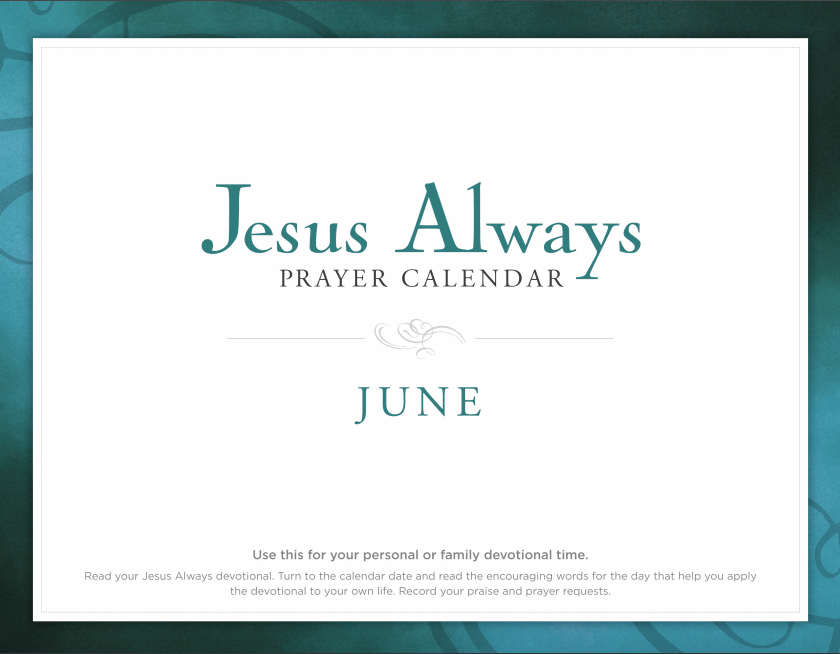 Are you looking for a way to keep track of your daily prayers along with Jesus Calling? The Jesus Calling family prayer calendar goes right along with your daily readings from Jesus Calling. Each day begins with a guided reflection, followed by a space for you to fill in your prayers of thanksgiving and special requests. You can get your free Jesus Calling Family Prayer calendar by visiting JesusCalling.com/offer
Are you looking for a way to keep track of your daily prayers along with Jesus Calling? The Jesus Calling family prayer calendar goes right along with your daily readings from Jesus Calling. Each day begins with a guided reflection, followed by a space for you to fill in your prayers of thanksgiving and special requests. You can get your free Jesus Calling Family Prayer calendar by visiting JesusCalling.com/offer
Narrator: Our next guests are country music performer and Christian music producer Mark Miller, and his daughter Madison Brown. When Mark Miller and his country music band Sawyer Brown won their season of Star Search in the 1980s, they looked around at the Hollywood lifestyle and chose to live and perform a little differently from the rest. And sure enough, almost 40 years later, the band and their families are reaping the benefits of those decisions. Today Mark and Madison talk about growing up on the road, how they’ve seen God work in ways they didn’t expect, and how a family text thread about Jesus Calling keeps their ties stronger than ever.

Mark: I’m Mark Miller, and I’m the lead singer in the band called Sawyer Brown. We’ve been together for 37 years now. I am told on Wikipedia that we have 51 chart records, 23 albums. I also produce the band Casting Crowns, a Christian rock band. And I am Madison and Gunner’s dad and Lisa Miller’s husband.
Madison: It’s, for sure, your best role.
Mark: Yes.
Madison: I am Madison Brown. That is my married name, ironically enough. I am the host of a travel TV show on RFD-TV called Chasing Down Madison Brown, where I chase down the best food people and farms in the country. It’s based loosely on my growing up with this guy out on tour because he decided if he was gonna have a family, us and the dog were all gonna come along.

Yes, I think the year that we brought the dog with us was really the year that we all grew quite close.
Mark: Yeah. Madison had a golden retriever. Abby was not a small golden retriever, and she . . .
Madison: Came out with us.
Mark: So . . .
Madison: So yeah, we literally packed up everything and put it on the bus like the Beverly Hillbillies. It was great.
Keeping Faith in a “Rock Star” Life
Mark: Well, I grew up in in Florida. And just like every other Floridian kid, I surfed, I skied. When I was 16, I got a job at Walt Disney World as a trick water skier. And so I did that all through college.
But I grew up in church. The earliest memories I have of anything musical, it was all based and centered around the church. It was a Pentecostal church, and I still consider myself Pentecostal.
The way a lot of people talk about our music, they [say] it has a lot of energy, but our music definitely had energy in the Pentecostal church. We were called “the holy rollers.” And I love that interpretation of the Holy Spirit, in music. It has a lot of energy. There’s a lot of soul in it, and I think you can hear that in some of the stuff that I’ve done in Sawyer Brown.
We got our start on a TV show called Star Search. I tell the kids I was the original American Idol.
Madison: Which I did not believe until the wonderful world of YouTube came about, and I found the original Star Search tapes of him in the 80s, winning Star Search. I was like, “Oh my gosh, I think he’s telling the truth!” I sent it to my little brother, and he was like, “He hasn’t been lying all these years!” So thank you, YouTube.
Mark: I think that was kind of jumpstart to our career, and you know how the media is: there’s just this huge onslaught. You’re everywhere in popularity, and you know, that really messes with your head. And I will tell you that my faith was the thing that kept me level, because there’s so much stuff thrown at you.
I remember the very first meeting that I went into with the president of Capitol Records, coming off of that show. And I said, “Well, listen, you have to understand I’m a Christian. There are certain things I won’t sing about.”
When you think of country music, you think of drinking, and cheating songs, and all that. And I just said, “Listen, that’s not who I am. And if you expect me to participate in those kind of songs, you’ve got the wrong guy.”
I remember him just getting a big smile on his face and he says, “You can do whatever you want.”
And they stuck to that, my whole career. I was always allowed to produce our records. I was allowed to choose all of our songs. I wrote most of our songs, and they never wavered on that. 37 years later, I look back and that was the original stand that I took. And it really gave me more confidence in my faith at that point, because there were several other things throughout my career that were crossroads that really challenged my faith. I always went in the direction of my faith, and it always was the right thing to do.
“There were several other things throughout my career that were crossroads that really challenged my faith. I always went in the direction of my faith, and it always was the right thing to do.” – Mark Miller
Being a Christian man in a Christian family, when we decided to have kids, I was on tour full time, probably doing 250 dates a year, and I wanted the family out with me. Even though “you’re a rock star,” I didn’t buy into the rock star lifestyle. I bought into, “That’s what I do for a living.” That’s was my business. But I still believed in the family, in my faith.
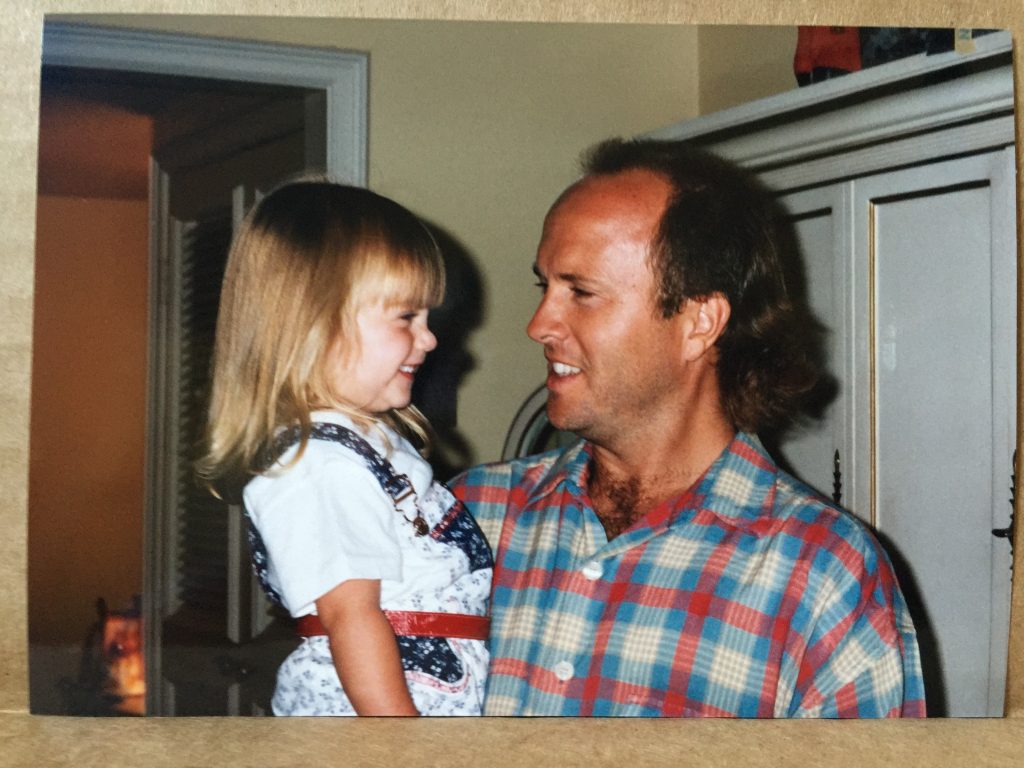
And so they were out with me. We had our own bus, and they would go out all the time. There was always that family time, and then we would pull in backstage with the bus, and Dad would get out and do his show. And most of the time, they would not even come off the bus. They were watching TV or making dinner or whatever. But I think they grew up, hopefully, [feeling like], “That’s just what Dad did for a living.” It wasn’t any different than kids’ dads who were firemen or whatever. It’s just, “That’s how we get to work, in the bus. And Dad goes to work, and he comes back on the bus two hours later.”
Madison: And I just never put it together that it was abnormal until I was in school with other kids and realized, “What do you mean, you don’t have a tour bus? How do you get to the places?”
And then this was really weird too. “What do you mean your dad is home every single day?” I think that was a very bizarre because I was like, “Well your dad works, and working means he goes away and comes back.” And now I’ve found out that there are these things called “nine to fives.”
But it was nice. I think that was the way that you guys wanted it. It was just so normal to us. If you looked at the nuts and bolts of a family unit and all of that kind of stuff, our life was way normal.
Mark: That was a conscious effort, to make it as normal as possible. And we were really strict on the kids. I had been around a lot of the celebrities’ kids, and I thought, You know what? I don’t ever want them to grow up and think that they’re entitled. I want them to grow up the way that I did, to know that if you’re willing to work, you can achieve anything you want to. But you have to work to get it.
“I want [my kids] to grow up the way that I did, to know that if you’re willing to work, you can achieve anything you want to. But you have to work to get it.” – Mark Miller
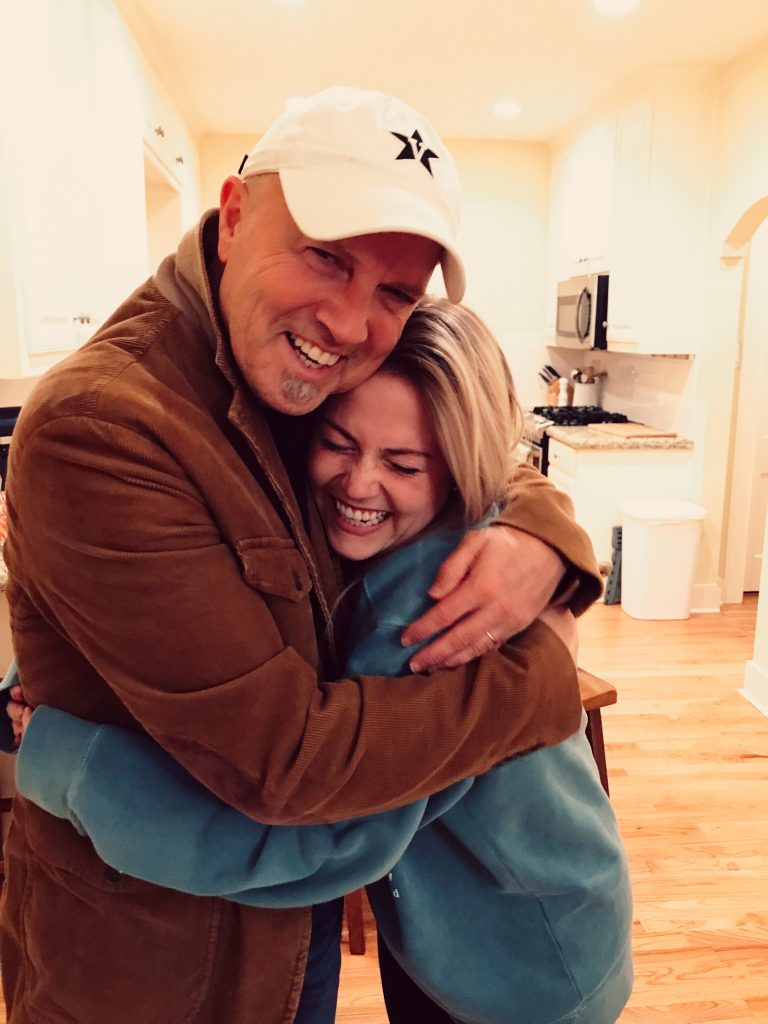
Madison: There is not a lot of “me time” on a bus, which I think has contributed to our family being far too close. That’s probably our problem. We’re not too distant, we’re too close together. Because yeah, there’s only, what, forty-five feet that you can go to escape someone? You had to learn to get along in a very confined space for a very extended period of time.
But I think a lot of it was really good, because you couldn’t escape, so you had to learn to deal with each other, and the standard for what that behavior was going to be was pretty high. We were always taught one of the greatest verses in the Bible was, “Love your sibling.” Yeah. And that was reiterated many a time on the bus.
Staying Close to God Gets Us Where We Need to Go
Madison: I’m pretty sure the first time I saw Sarah Young’s Jesus Calling was when I was in high school, at a summer camp out in Colorado.
I remember someone, I think it was one of the older camp counselors, had this book and was just telling us it was a great way to have a daily devotion we could all do really simply everyday. They had the Bible verses pulled for you, and that it was very practical. It was really advocated for as a practical way for high schoolers to be daily in the Word, and it was broken down in a way that was God speaking to you, which I think really appealed to me personally at the time in high school. I was really looking for that type of relationship with God then.
I can’t remember if I was gifted the book or if I went out and bought it for myself. I remember my mom looking at it being like, “This is perfect for your dad. There aren’t a lot of words.” Because he famously doesn’t—
Mark: My attention span is about that long. So it was . . .
Madison: It was perfect.
Mark: This is perfect for me. It really is a great inspiration for me to be able to read this, because I really have a short attention span. So this is perfect. One page, and I can really dial in and read it. If there are other guys out there like that, this is the book [for you].
Madison: And we also read it all the time. My mother has decided to integrate Jesus Calling and technology together by these lovely family group texts, where all it will be—
Mark: She’ll take a picture of the page.
Madison: With some highlighted portions.
Mark: And send it.
It’s just like, you know when you’re in church or whatever, and you hear the sermon and the pastor says something, and you’re thinking, Well, so-and-so needs to hear that, when in reality you’re supposed to be hearing it too. Well, when my wife reads this, she’ll read stuff she thinks that I need to know and my brother or my son needs to.
Madison: Or me.
Mark: Or her.
Madison: And so sometimes she will not-so-subtly let us know that, “The Jesus Calling [devotion] today really pertains to you and what’s going on in your life. And you could use some of that today.”
Mark: I hope she doesn’t see this, but she’s usually right.
Madison: We don’t tell her that!
So it’s kind of become not only a great way for all of us to have a good daily devotional, but at the same time a great way to stay together as a family.
”[Jesus Calling has] become not only a great way for all of us to have a good daily devotional, but at the same time a great way to stay together as a family.” – Madison Brown
And we also really like it because even if—as you know, I’ve read this book a lot, cover to cover, but you always seem to pick up something new every time, which is pretty great. Or in your case, you’ve just forgotten it.
There’s one I have always really loved. It’s actually from Jesus Calling May 1st, and it says:
You are on the path of My choosing. There is no randomness about your life. Here and Now comprise the coordinates of your daily life. Most people let their moments slip through their fingers, half-lived. They avoid the present by worrying about the future or longing for a better time and place. They forget that they are creatures who are subject to the limitations of time and space. They forget their Creator, who walks with them only in the present.
Every moment is alive with My glorious Presence, to those whose hearts are intimately connected with Mine. As you give yourself more and more to a life of constant communion with Me, you will find that you simply have no time for worry. Thus, you are freed to let My Spirit direct your steps, enabling you to walk along the path of Peace.
And that one in particular we love because I think a lot about our life can seem quite random, and so just to know that, it’s always been a great reminder for me that we are on the path of God choosing. And if we are in that constant communion and communication with Him and that’s where our focus is, we’re gonna get to where we need to go because we’re going to continue to be on the path that the Lord wants us on.
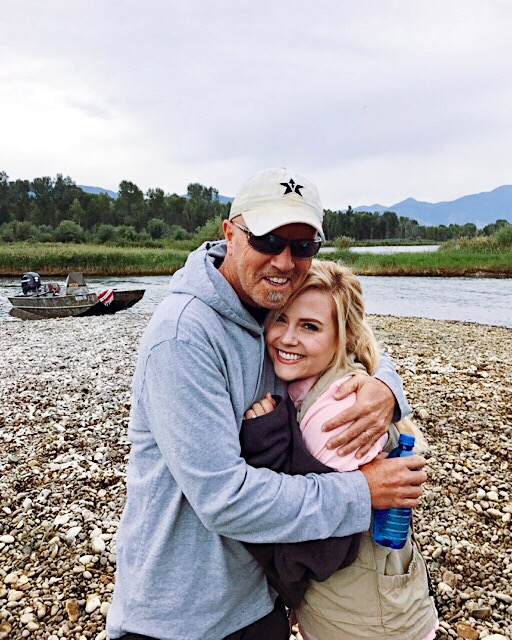
Mark: God, I think, has a sense of humor. Mark Hall and I talk about that all the time. Mark Hall is the lead singer of Casting Crowns. And they’ve gone on and become extremely successful in Christian rock world. But you’ve got a country artist that has a Christian label, which is me, that produces this band. And Mark Hall at the time was a 34-year-old youth pastor with a wife and three kids. Everybody had kind of told him that he was way long in the tooth to get a record deal and all that. And then God just says, “Hey, I’m going to show you what I can do when I want to make a move and do something.”
And that’s what He did. And in everything that has happened with Casting Crowns, it’s just been such a display of God showing what He can do with the most unlikely situation. And that’s also been fun for me not only to watch, but to have a front row seat, to be a part of.
I’ve been pretty blessed to wear a lot of hats, and the only qualification that I’ve ever had is that God opened that door.
Narrator: You can find where Sawyer Brown is playing a show near you at sawyerbrown.com. To watch Chasing Down Madison Brown on RFD-TV, check your local listings.
Narrator: If you’d like to hear more stories about dads working to raise kids with faith, check out our interview with writer Bob Goff and his daughter Lindsay Goff Viducich.
Narrator: Next time on the Jesus Calling Podcast, we speak with evangelist, movie producer and author T. D. Jakes. When we caught up with Pastor Jakes, he reminded us that it’s important to have empathy for others, no matter what they “seem” to be portraying on the outside, as those who may appear to be achieving great success in one area of their life may be experiencing devastation in another.
TD Jakes: I’m at that stage of my life now that I really want to leave footprints behind about what it really costs to be who you are and how to survive crushings that people don’t see, because they see you only through the window of how they understand you to be. But life is much bigger than 30 minutes on television or an hour on television. Life is much bigger than eight hours on a job, and sometimes we make assumptions about people we work with live next door to us or we see on TV that are not correct assumptions about what their whole life is like.

